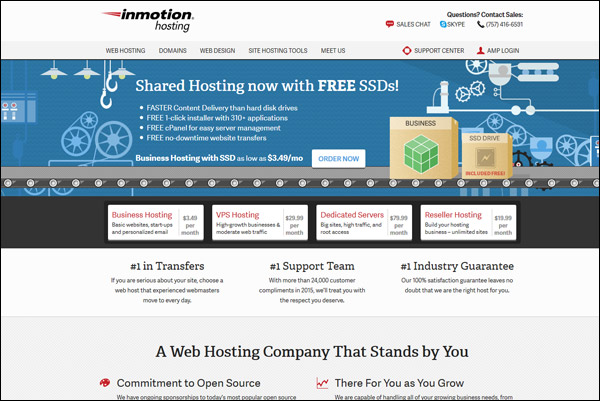5 Best Cloud Web Hosting Providers of 2021
Cloud web hosting operates on the most advanced software platforms available for web server network management in web publishing and often includes a higher level of premium hardware than is found on shared hosting accounts. Cloud hosting plans use network load balancing, multi-layered page caching, server virtualization, CDN integration, and scalable resource allocation to improve website performance. Most cloud hosting platforms are designed to keep websites online across all levels of user traffic activity, even when page visits spike due to special promotions, press releases, or social media link sharing. Cloud hosting plans typically include more RAM and dedicated CPU cores on accounts than available under shared hosting frameworks, which leads to better performance for CMS websites and other database applications. Many web hosting companies currently price their cloud hosting services at an intermediate level with costs often lower than those found on VPS or dedicated server plans.
This article will review the five best cloud hosting companies that we have identified for web development on the basis of web server hardware performance, platform features, quality of customer support, included software tools, and the affordability of each plan. Read on to learn more about our list of top 5 cloud web hosting providers and be sure to use our coupons when signing up for even better discounts on a new cloud hosting account.
Our Top 5 Favorite Cloud Hosting Providers:
| Web host: | Price range: | CPU: | RAM: | Learn more: |
|---|---|---|---|---|
| HostGator | $4.95 to $9.95/mo | 2 to 6 cores | 2 to 6 GB | View Plans |
| InMotion Hosting | $29.99 to $74.99/mo | 2 to 6 cores | 2 to 6 GB | View Plans |
| Bluehost | $6.95 to $15.95/mo | 2 to 6 cores | 2 to 6 GB | View Plans |
| SiteGround | $80.00 to $240.00/mo | 2 to 8 cores | 2 to 10 GB | View Plans |
| Rackspace | Custom | Custom | Custom | View Plans |
1. HostGator – Affordable & Reliable Hybrid Cloud Web Hosting

2. InMotion Hosting – Cloud-based VPS Hosting for Larger Sites

3. Bluehost – All-Purpose Hybrid Cloud Web Hosting

4. SiteGround – Cloud Web Hosting for Serious Power & Features

5. Rackspace – True Cloud Hosting for Enterprises

What to Look for When Purchasing a Cloud Web Hosting Plan
Although there is not a well established, agreed upon definition of what exactly constitutes cloud hosting, the main principle revolves around the use of clusters of web servers (“the cloud”) to replace the traditional single server model of web publishing, file sharing, and remote application deployment so that a wider user base or higher level of simultaneous online services can be sustained than a single hardware instance can provide. This definition combines aspects of elastic cloud technology, where a single server is able to replicate itself on demand through virtual instances to create multiple copies of a website and database to deploy in order to meet the demands of traffic spikes in resource demand, with elements of cloud computing, where applications are hosted on remote machines on a network model and then used through a web browser, rather than being installed on a desktop computer. Cloud hosting combines elements of both elastic cloud technology and cloud computing, but whereas most of what operates through web scripts, databases, and mobile applications on a web server meets the definition of cloud computing, very few web hosting companies actually offer elastic cloud frameworks. The two primary innovators of elastic cloud technology are Amazon Web Services (AWS) and Rackspace.
Cloud hosting typically involves advanced load balancing for user traffic over web server networks, improved file caching facilities for web pages, the use of VPS platform technology, and the provisioning of snapshots that allow for full stack deployments of installed server software. OpenStack, CloudStack, KVM, Ceph, and Bitnami are all examples of common software implementations for data centers that are currently used in cloud hosting. Because the field is so new, constantly evolving through project development and platform innovation, many web hosting companies are building their own “Platform as a Service” products which are marketed as cloud hosting and combine many different software tools into a single integration. Nginx and Varnish Cache are also very popular in custom-built cloud hosting platform products, as are geo-locative CDN caching features such as CloudFlare. Burstable RAM, scalable server resource allocation, data mirroring, and “pay as you go” pricing for CPU usage or file storage rather than a fixed rate plan structure can all also be commonly found on many of the new cloud hosting plans. Cloud hosting is designed to make sure that the largest websites and remote applications remain always online to meet whatever web traffic requirements arise, managing traffic spikes and “slashdotting” events seamlessly. Cloud hosting services may also be used to meet the demands of “big data” through specialized search, database utilities, and the deployment of new programming languages.
Some of the most important features to look for when deciding on the purchase of a cloud hosting plan are:
- Elastic Cloud Technology – servers scale into multiple instances in clusters which can be positioned in different data centers by geo-location internationally
- Premium Hardware with Low Density – use of the latest multi-core servers and solid state drives (SSDs) with a lower number of domains registered on each server
- Load Balancing on Network Traffic – data is mirrored in multiple copies on server arrays while real-time network monitoring optimizes the routing of user requests
- Advanced Page Caching – integrated deployment of Nginx, Varnish Cache, APC, OPcache, & Memcached in multiple layers for faster website performance using cached pages
- Integrated CDN Support – published website pages can be cached on content delivery network (CDN) servers globally for faster download times to major media markets
- Scalable System Resources – allocation of CPU cores, RAM, & storage on accounts can be changed or scheduled to meet the demands of variable rates of web traffic
- Software Stack Snapshots – installation of server software stacks can be deployed from snapshots and live sites can be saved or restored through snapshot portraits
- “Pay as you Go” Billing – CPU resource usage, RAM allocation, & web storage is billed according to actual usage rates rather than at a fixed rate of monthly charges
Elastic cloud hosting accounts cost more than shared cloud hosting plans because of the extra layer of proprietary technology offered on the platform, the dedication of additional system resources through virtualization, and the level of web traffic able to be supported by each account. Elastic cloud platforms can be used as an alternative to dedicated servers or VPS plans for large websites whose resource usage needs to scale to manage traffic spikes that frequently exceed the limits of standard accounts. Hybrid cloud platform services are a beneficial upgrade for website owners on traditional shared hosting plans who need more server resources to support CMS websites or other database driven scripts. The lower priced cloud plans can also be very cost-effective for small businesses and independent publishers who are seeking advanced page caching features but do not want to spend the additional money for custom web development solutions. Platform as a Service cloud hosting services make the tried and tested solutions used to scale the largest websites in the world to hundreds of millions of page views available to small business website owners at prices competitive with shared hosting plans. Developers can take advantage of cloud features like stack snapshots, premium hardware, and scalable resource allocation to speed up the time of deployment and optimize overall website performance. Cloud hosting solutions are recommended for most professional website applications because they specialize in matching the optimal amount of server hardware resources to meet the processing requirements of web scripts under any level of user traffic conditions.
Advancements in web hosting are driven primarily by progressive developments in hardware, software, and network management technology. Many of the cloud hosting solutions have evolved from the “big data” solutions used in enterprise and by the largest companies on the web to manage their data centers. Cloud solutions are in the process of transforming traditional shared hosting accounts completely, eliminating reliance on the single server model and enabling websites to scale resources more effectively to meet any type of web traffic. The web scripts used by many of the smallest websites and blogs, for example WordPress, Drupal, Joomla, etc. can also scale to support the largest web traffic in the world. These factors, especially when they are based on open source software foundations, place extremely powerful software and hardware solutions in the hands of virtually any business or publisher on the internet. Cloud hosting solutions make the latest developments in network computing available for use within the budgetary limitations of almost any web development project. While there are a wide variety of competing platform services found on the various cloud hosting plans offered by the different companies in the sector, the performance gains for database-driven websites, CMS scripts, web & mobile applications are significant for most web publishers. Website owners are recommended to upgrade to retail cloud hosting plans over shared hosting accounts to take advantage of these benefits. Cloud hosting plans represent the next generation of web hosting and are available currently at an introductory level with a cost difference that is often only $2 to $3 per month more than comparable shared Linux or Windows plans.


